- Home
- W. Somerset Maugham
Christmas Holiday Page 9
Christmas Holiday Read online
Page 9
He pondered, his brow knit in concentration, the long, unhappy story to which he had listened all the afternoon. Lydia had gone back and forth, now telling him of her struggle to live when she was working for a pittance at a dressmaker’s and after that some incident of her poverty-stricken childhood in London; then more of those agonizing days that followed the murder, the terror of the arrest and the anguish of the trial. He had read detective stories, he had read the papers, he knew that crimes were committed, he knew that people lived in penury, but he had known it all, as it were from the outside; it gave him a strange, a frightening sensation to find himself thrown into personal contact with someone to whom horrible things had actually happened. He remembered suddenly, he did not know why, a picture of Manet’s of somebody’s execution—was it Maximilian’s?—by a shooting squad. He had always thought it a striking picture. Now it came to him as a shock to realize that it portrayed an incident that had occurred. The Emperor had in fact stood in that place, and as the soldiers levelled their rifles, it must have seemed incredible to him that he should stand there and in a moment cease to live.
And now that he knew Lydia, now that he had listened to her last night and that day, now that he had eaten with her, and danced with her, now that for so many hours they had lived together in such close proximity, it seemed unbelievable that such things should have befallen her.
If ever anything looked like pure chance it was that Lydia and Robert Berger met at all. Through the friends she lived with, who worked in a Russian restaurant, Lydia sometimes got a ticket for a concert, and when she couldn’t and there was something she very much wanted to hear, she scraped together out of her weekly earnings enough to buy herself standing-room. This was her only extravagance and to go to a concert her only recreation. It was chiefly Russian music she liked. Listening to that she felt that somehow she was getting to the heart of the country she had never seen, but which drew her with a yearning that must ever remain unsatisfied. She knew nothing of Russia but what she had heard from the lips of her father and mother, from the conversation between Evgenia and Alexey when they talked of old times, and from the novels she had read. It was when she was listening to the music of Rimsky-Korsakov and Glazounov, to the racy and mordant compositions of Stravinsky, that the impressions she had thus gained gathered form and substance. Those wild melodies, those halting rhythms, in which there was something so alien from Europe, took her out of herself and her sordid existence and overwhelmed her with such a passion of love that happy, releasing tears flowed down her cheeks. But because nothing of what she saw with the mind’s eye had she seen with a bodily eye, because it was a product of hearsay and a fevered imagination, she saw it in a strangely distorted fashion; she saw the Kremlin, with its gilt and star-sprinkled domes, the Red Square and the Kitai Gorod, as though they were the setting of a fairy tale; for her Prince Andrey and the charming Natasha still went their errands in the busy streets of Moscow, Dmitri Karamazov, after a wild night with the gipsies, still met the sweet Alyosha on the Mostbaretsk Bridge, the merchant Rogozhin dashed past in his sled with Nastasya Filippovna by his side, and the wan characters of Chekov’s stories drifted hither and yon at the breath of circumstance like dead leaves before the wind; the Summer Garden and the Nevsky Prospekt were magic names, and Anna Karenina still drove in her carriage, Vronsky elegant in his new uniform climbed the stairs of the great houses on the Fontanka Canal, and the misbegotten Raskolnikov walked the Liteiny. In the passion and nostalgia of that music, with Turgeniev at the back of her mind, she saw the spacious, dilapidated country houses where they talked through the scented night, and the marshes, pale in the windless dawn, where they shot the wild duck; with Gorki, the wretched villages where they drank furiously, loved brutally and killed; the turbid flow of the Volga, the interminable steppes of the Caucasus, and the enchanting garish Crimea. Filled with longing, filled with regret for a life that had passed for ever, homesick for a home she had never known, a stranger in a hostile world, she felt at that moment one with the great, mysterious country. Even though she spoke its language haltingly, she was Russian, and she loved her native land; at such moments she felt that there was where after all she belonged and she understood how it was that her father, despite the warnings, was obliged, even at the risk of death, to return to it.
It was at a concert, one where all the music was Russian, that she found herself standing next to a young man who, she noticed, now and then looked at her curiously. Once she happened to turn her eyes on him and was struck by the passionate absorption with which he seemed to be listening; his hands were clasped and his mouth slightly open as though he were out of breath. He was rapt in ecstasy. He had clean-cut features and looked well-bred. Lydia gave him but a passing glance and once more returned to the music and the crowding dreams it awoke in her. She too was carried away and she was hardly aware that a little sob broke from her lips. She was startled when she felt a small, soft hand take hers and give it a slight pressure. She quickly drew her hand away. The piece was the last before the interval and when it ended the young man turned to her. He had lovely eyes, gray under bushy eyebrows, and they were peculiarly gentle.
“You’re crying, Mademoiselle.”
She had thought he might be Russian like herself, but his accent was purely French. She understood that that quick pressure of her hand was one of instinctive sympathy, and was touched by it.
“Not because I am unhappy,” she answered, with a faint smile.
He smiled back and his smile was charming.
“I know. This Russian music, it’s strangely thrilling and yet it tears one’s heart to pieces.”
“But you’re French. What can it mean to you?”
“Yes. I’m French. I don’t know what it means to me. It’s the only music I want to listen to. It is power and passion, blood and destruction. It makes every nerve in my body tingle.” He gave a little laugh at himself. “Sometimes when I listen to it I feel there is nothing that man is capable of that I cannot do.”
She did not answer. It was singular that the same music could say such different things to different people. To her the music they had just heard spoke of the tragedy of human destiny, the futility of striving against fate, and the joy, the peace of humility and resignation.
“Are you coming to next week’s concert?” he asked then. “That’s to be all Russian too.”
“I don’t think so.”
“Why not?”
He was very young, he could be no older than herself, and there was an ingenuousness in him that made it impossible for her to answer too stiffly a question which in a stranger was indiscreet. There was something in his manner that made her sure he was not trying to pick her up. She smiled.
“I’m not a millionaire. They’re rare now, you know, the Russians who are.”
“I know some of the people who are running these concerts. I have a pass that admits two. If you like to meet me next Sunday in the doorway, you can come in on it.”
“I don’t think I could quite do that.”
“Do you think it would be compromising?” he smiled. “The crowd would surely be a sufficient chaperon.”
“I work in a dressmaker’s shop. It would be hard to compromise me. I don’t know that I can put myself under an obligation to a total stranger.”
“I am sure you are a very well-brought-up young lady, but you should not have unreasonable prejudices.”
She did not want to argue the point.
“Well, we’ll see. In any case I thank you for the suggestion.”
They talked of other things till the conductor once more raised his baton. At the end of the concert he turned to say good-bye to her.
“Till next Sunday then?” he said.
“We’ll see. Don’t wait for me.”
They lost one another in the crowd that thronged towards the exits. During the next week she thought from time to time of the good-looking young man with the large gray eyes. She thought of him with pleasure. She had not a
rrived at her age without having had to resist now and then the advances of men. Both Alexey and his son the gigolo had made a pass at her, but she had not found it difficult to deal with them. A smart box on the ear had made the lachrymose drunkard understand that there was nothing doing, and the boy she had kept quiet by a judicious mingling of ridicule and plain speech. Often enough men had tried to pick her up in the street, but she was always too tired and often too hungry to be tempted by their advances; it caused her a grim amusement to reflect that the offer of a square meal would have tempted her much more than the offer of a loving heart. She had felt, with her woman’s instinct, that the young man of the concert was not quite like that. Doubtless, like any other youth of his age, he would not miss an opportunity for a bit of fun if he could get it, but it was not for the sake of that that he had offered to take her to the concert on Sunday. She had no intention of going, but she was touched that he had asked her. There was something very nice about him, something ingenuous and frank. She felt that she could trust him. She looked at the programme. They were giving the Symphonie Pathétique, she didn’t much care about that, Tchaikovsky was too Europeanized for her taste, but they were giving also the Sacre du Printemps and Borodin’s string quartet. She wondered whether the young man had really meant what he said. It might very well be that his invitation had been issued on the spur of the moment and in half an hour completely forgotten. When Sunday came she had half a mind to go and see, she did very much want to hear the concert, and she had not a penny more in her pocket than she needed for her Metro and her lunches during the week, she had had to give everything else to Evgenia to provide the household with food; if he was not there no harm would have been done, and if he was and really had a pass for two, well, it would cost him nothing and committed her to nothing.
Finally an impulse took her to the Salle Pleyel and there he was, where he had said he would be, waiting for her. His eyes lit up and he shook her warmly by the hand as though they were old friends.
“I’m so glad you’ve come,” he said. “I’ve been waiting for twenty minutes. I was so afraid I’d miss you.”
She blushed and smiled. They went into the concert room and she found he had seats in the fifth row.
“Did you get these given you?” she asked with surprise.
“No, I bought them. I thought it would be nice to be comfortable.”
“What folly! I’m so used to standing.”
But she was flattered by his generosity and when presently he took her hand did not withdraw it. She felt that if it gave him pleasure to hold it, it did her no harm, and she owed him that. During the interval he told her his name, Robert Berger, and she told him hers. He added that he lived with his mother at Neuilly and that he worked in a broker’s office. He talked in an educated way, with a boyish enthusiasm that made her laugh, and there was an animation about him that Lydia could not but feel attractive. His shining eyes, the mobility of his face, suggested an ardent nature. To sit next to him was like sitting in front of a fire; his youth glowed with a physical warmth. When the concert was over they walked along the Champs-Élysées together and then he asked her if she would like some tea. He would not let her refuse. It was a luxury Lydia had never known to sit in a smart tea-shop among well-dressed people, and the appetizing smell of cakes, the heady smell of women’s perfume, the warmth, the comfortable chairs, the noisy talk, went to her head. They sat there for an hour. Lydia told him about herself, what her father had been and what had happened to him, how she lived now and how she earned her living; he listened as eagerly as he talked. His gray eyes were tender with sympathy. When it was time for her to go he asked her whether she would come to a cinema one evening. She shook her head.
“Why not?”
“You are a rich young man, and …”
“Oh, no, I’m not. Far from it. My mother has little more than her pension and I have only the little I make.”
“Then you shouldn’t have tea at expensive tea-rooms. Anyhow I am a poor working girl. Thank you for all your kindness to me, but I am not a fool; you have been sweet to me, I don’t think it would be very nice of me to accept more of your kindness when I can make no return for it.”
“But I don’t want a return. I like you. I like to be with you. Last Sunday, when you were crying, you looked so touching, it broke my heart. You’re alone in the world, and I—I’m alone too in my way. I was hoping we could be friends.”
She looked at him coolly for a moment. They were the same age, but of course really she was years older than he; his mien was so candid she had no doubt that he believed what he said, but she was wise enough to know that he was talking nonsense.
“Let me be quite frank with you,” she said. “I know I’m not a raving beauty, but after all I’m young and there are people who think me prettyish, people who like the Russian type, it’s asking too much of me to believe that you are seeking my society just for the pleasure of my conversation. I’ve never been to bed with a man. I don’t think it would be very honest of me if I let you go on wasting your time and your money on me when I have no intention of going to bed with you.”
“That is frank enough in all conscience,” he smiled, oh, so charmingly, “but you see, I knew that. I haven’t lived in Paris all my life without learning something. I know instinctively whether a girl is ready for a little fun or if she isn’t. I saw at once that you were good. If I held your hand at the concert it was because you were feeling the music as deeply as I was, and the touch of your hand—I hardly know how to explain it—I felt that your emotion flowed into me and gave mine a richer intensity. Anyhow there was in my feeling nothing of desire.”
“And yet we were feeling very different things,” she said thoughtfully. “Once I looked at your face and I was startled by its expression. It was cruel and ruthless. It was not like a human face any more, it was a mask of triumphant malice. It frightened me.”
He laughed gaily and his laugh was so young, so musical and care-free, the look of his eyes so tenderly frank, it was impossible to believe that for a moment under the influence of that emotional music his features had borne an expression of such cold ferocity.
“What fancies you have! You don’t think I am a white-slaver, like at the cinema, and that I am trying to get you into my clutches and shall then ship you out to Buenos Aires?”
“No,” she smiled, “I don’t think that.”
“How can it hurt you to come to the pictures with me? You’ve made the position quite clear and I accept it.”
She laughed now. It was absurd to make so much fuss. She had little enough amusement in her life, and if he liked to give her a treat and was content merely to sit beside her and to talk, she would be a fool to forgo it. After all, she was nothing. She need answer for her actions to nobody. She could take care of herself and she had given him full warning.
“Oh, very well,” she said.
They went to the pictures several times and after the show Robert accompanied Lydia to whichever was the nearest station for her to get a train home. During the little walk he took her arm and for a part of the performance he held her hand, once or twice when they parted he kissed her lightly on both cheeks, but these were the only familiarities he permitted himself. He was good company. He had a chaffing, ironic way of talking about things that pleased her. He did not pretend to have read very much, he had no time, he said, and life was more entertaining than books, but he was not stupid and he could speak intelligently of such books as he had read. It interested Lydia to discover that he had a peculiar admiration for André Gide. He was an enthusiastic tennis-player and he told her that at one time he had been encouraged to take it seriously; people of importance in the game, thinking he had the making of a champion, had interested themselves in him. But nothing came of it.

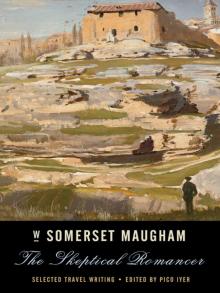 The Skeptical Romancer: Selected Travel Writing
The Skeptical Romancer: Selected Travel Writing The Summing Up
The Summing Up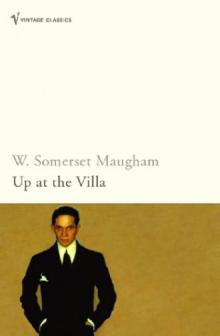 Up at the Villa
Up at the Villa The Razor's Edge
The Razor's Edge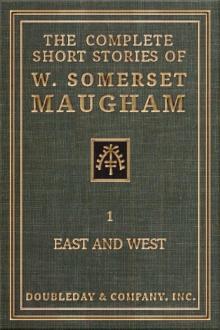 The Complete Short Stories of W. Somerset Maugham: East and West (Vol. 1 of 2))
The Complete Short Stories of W. Somerset Maugham: East and West (Vol. 1 of 2))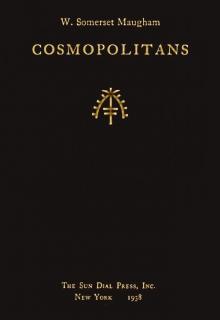 Cosmopolitans
Cosmopolitans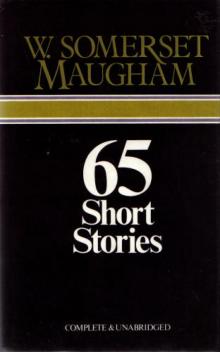 65 Short Stories
65 Short Stories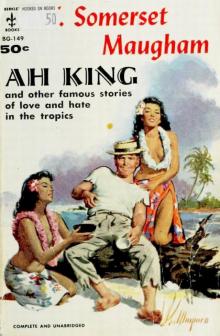 Ah King (Works of W. Somerset Maugham)
Ah King (Works of W. Somerset Maugham)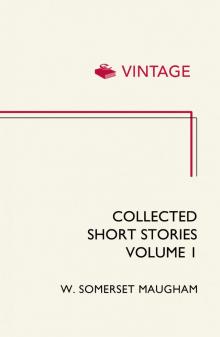 Collected Short Stories: Volume 1
Collected Short Stories: Volume 1 Collected Short Stories Volume 2
Collected Short Stories Volume 2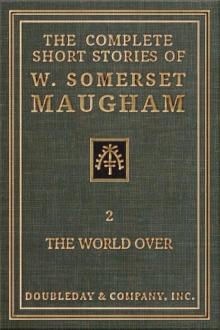 The Complete Short Stories of W. Somerset Maugham - II - The World Over
The Complete Short Stories of W. Somerset Maugham - II - The World Over Collected Short Stories Volume 4
Collected Short Stories Volume 4 Theatre
Theatre Short Stories
Short Stories Then and Now
Then and Now The Favorite Short Stories of W. Somerset Maugham
The Favorite Short Stories of W. Somerset Maugham Of Human Bondage
Of Human Bondage The Magician
The Magician The Great Exotic Novels and Short Stories of Somerset Maugham
The Great Exotic Novels and Short Stories of Somerset Maugham A Writer's Notebook
A Writer's Notebook Christmas Holiday
Christmas Holiday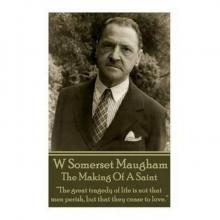 The Making of a Saint
The Making of a Saint Merry Go Round
Merry Go Round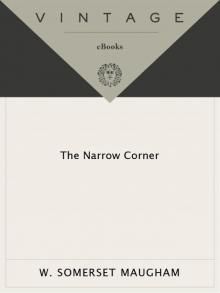 The Narrow Corner
The Narrow Corner Collected Short Stories Volume 3
Collected Short Stories Volume 3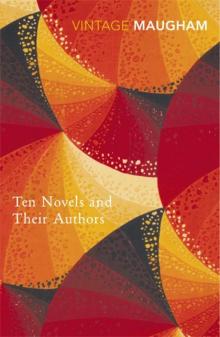 Ten Novels and Their Authors
Ten Novels and Their Authors Ashenden
Ashenden The Moon and Sixpence
The Moon and Sixpence Cakes and Ale
Cakes and Ale Liza of Lambeth
Liza of Lambeth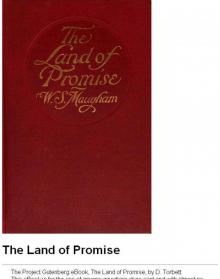 The Land of Promise: A Comedy in Four Acts (1922)
The Land of Promise: A Comedy in Four Acts (1922) A Writer's Notebook (Vintage International)
A Writer's Notebook (Vintage International)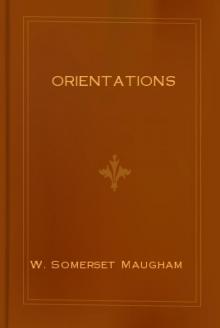 Orientations
Orientations Selected Masterpieces
Selected Masterpieces Mrs Craddock
Mrs Craddock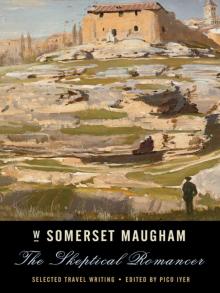 The Skeptical Romancer
The Skeptical Romancer On a Chinese Screen
On a Chinese Screen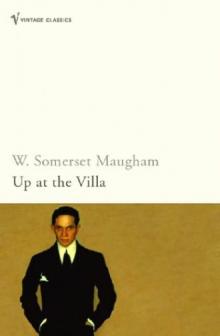 (1941) Up at the Villa
(1941) Up at the Villa The Great Novels and Short Stories of Somerset Maugham
The Great Novels and Short Stories of Somerset Maugham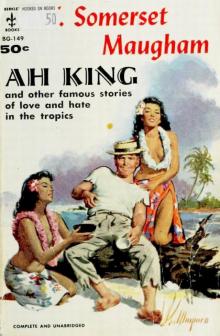 Ah King
Ah King The Explorer
The Explorer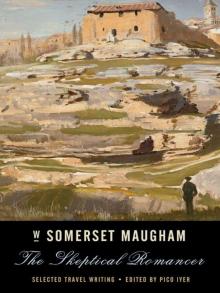 The Skeptical Romancer: Selected Travel Writing (Vintage Departures)
The Skeptical Romancer: Selected Travel Writing (Vintage Departures)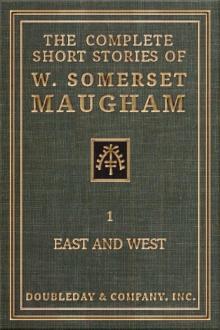 The Complete Short Stories of W. Somerset Maugham - I - East and West
The Complete Short Stories of W. Somerset Maugham - I - East and West